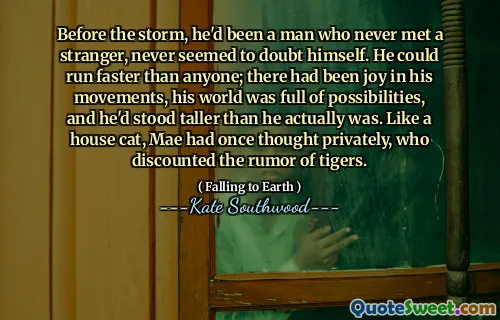
Before the storm, he'd been a man who never met a stranger, never seemed to doubt himself. He could run faster than anyone; there had been joy in his movements, his world was full of possibilities, and he'd stood taller than he actually was. Like a house cat, Mae had once thought privately, who discounted the rumor of tigers.
This quote beautifully captures a snapshot of a man’s persona before facing a difficult challenge or transformation – the metaphorical "storm." The imagery of a man so confident in himself that he never met a stranger indicates openness and an innate trust in the world, qualities that often make life seem boundless and full of potential. He is described as joyful in his physicality and capable beyond others, qualities that symbolize freedom and mastery over one’s environment. Yet beneath this vigorous, proud exterior lies a subtle vulnerability hinted at by Mae’s quiet observation, likening him to a house cat unaware or dismissive of looming threats such as tigers. This contrast suggests the inevitable confrontation with reality that will challenge his perceptions and perhaps irrevocably alter his worldview. The metaphor also evokes the universal human experience of innocence and unawareness before a life-altering event – a clash between perceived invincibility and harsh truths. It speaks to a common narrative in literature and real life where we all face our ‘storms’ that test our resilience and self-perception. The passage invites readers to reflect on their own moments before change, recognizing the glory and fragility of youthful confidence, and to hold compassion for the transitions life forces upon us as we confront new and terrifying realities. This contemplative interlude enriches the broader narrative by adding emotional depth and setting a powerful tone of impending transformation.


